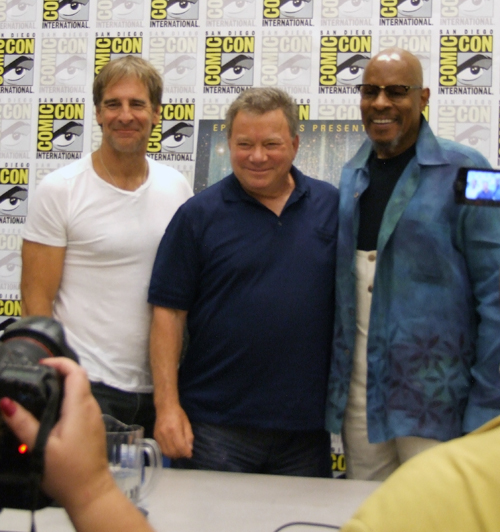
By Donald H. Harrison
SAN DIEGO – Three commanding officers of the Star Trek television series pondered for a Comic-Con audience on Friday, July
22, what has made the science fiction show remain popular over four decades.
William Shatner joined Avery Brooks and Scott Bakula at a press conference at the San Diego Convention Center, headquarters for the annual Comic-Con fan fest. Each actor had played the commanding officer in a Star Trek series. Shatner was Captain James T. Kirk in the original series; Brooks was Commander Benjamin Sisco in Star Trek: Deep Space Nine, and Bakula was Capt. Jonathan Archer in Star Trek: Enterprise.
Their news conference was called to promote the documentary Captains, now showing on the premium cable channel Epix, in which Shatner conducts conversations with other Star Trek captains to probe their feelings about the series and some of their most memorable moments.
Shatner said that the show’s popularity surpassed those of “tale well told” shows which could be recounted the following day around the office water cooler, and touched something deeper. “There is the family – the family of players in each of our iterations,” he said. The show captures their interactions “The fact that they care for each other and that we were in this lonely environment and all we had was each other, I think, resonated,” Shatner said.
Brooks, whose talents as a jazz musician were utilized in the documentary, agreed with Shatner, while suggesting that the show was “an affirmation of the ancient in modern ways.” He said the show not only was imaginative, but was able to provoke imaginative responses from its audience. “It is the people who hold the connection,” he said. “If you don’t turn it on, it doesn’t last for 44 years and counting.”
Bakula said he was a fan of Star Trek long before he ever was cast as Captain Jonathan Archer – who in an interesting twist of Star Trek chronology was a predecessor of Kirk’s, rather than a successor.
“The reason we are all here is this man seated here and his group of players who created this mythology who captured us,” said Bakula, indicating Shatner.
When he watched Shatner play Captain Kirk in the 1960s, he recalled, he was living in St. Louis, which he described as “a pretty white town, certainly where I was growing up, in my day. What the show represented (was) the way everyone treated everybody equally without question,” he said. “They dealt with their emotional differences, but not other differences – no color, no anything—none of that existed.
“It blew all that stuff away … in the middle of the 60s in this country,” Bakula said. “And if you got on board with that, that to me was the ride … If you got on board with that premise, none of that matters and we are going to reach out because the writers imagined it and we can hold that in our own bodies—that this is the future and that’s a future that we want to be part of, and here we are. That’s why I came to watch it.”
Not only was it a realization of the Civil Rights dream of the 1960, but in addition, Shatner suggested, Star Trek offered viewers the premise that mankind still would be alive in the future, that notwithstanding all the earthly conflicts, “we will find a way out.”

Harrison is editor of San Diego Jewish World. He may be contacted at donald.harrison@sdjewishworld.com File: US Canada West 01
Pingback: Captain, my captain, privileged is the actor who portrays you | San Diego Jewish World